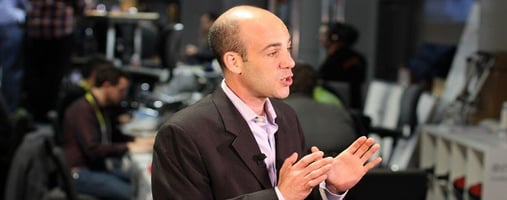Earlier this week we mentioned in this media training blog how media spokespeople need to be...
The World Cup later this year will put Qatar under the most intense of spotlights.
Hundreds of thousands of football fans will travel to the Gulf state.
Millions more will watch it from home on television.
Qatar hopes the tournament - the first Arab World Cup - will change perceptions and present it as a bold, modern, glittering, forward-thinking country.
But beneath the shiny stadiums and 5-star hotels, the spotlight will also fall on the country’s approach to LGBT and worker rights.
The draw for the tournament was held on Friday (1/4), and it offered an indication of what will come.
BBC 5 Live Breakfast marked the occasion by broadcasting from the country.
And one of the interviews (which you can listen to here at 2:54) grabbed our attention.
📻 This morning on #5LiveBreakfast @RickEdwards1 is in Qatar ahead of today's #2022WorldCup draw.
— BBC Radio 5 Live (@bbc5live) April 1, 2022
⚽️ Last night Rick watched an all-star football tournament and saw Fifa president Gianni Infantino miss an open goal 👀
🎧 Listen @BBCSounds 📲
It featured Khalifa Al Haroon, a Qatari influencer.
On our media training courses, we stress you can never be sure when journalists will ask the trickier questions. Sometimes they are left to the end as ‘while you are here’ style questions. On other occasions, they are asked from the start.
This interview began with a potentially awkward question about whether it was both “good and bad” to have such a spotlight shone on the country.
Mr Al Haroon replied by saying it was “good and good.”
“When all the different outlets are scrutinising the country, they are helping us to get better,” he said.
“They are helping to identify the issues in the country, and then hopefully, we can fix it.
“The problems lie when you don’t do anything, and we are complacent. Qatar is an active country and wants to get things done.”
Mr Al Haroon then built on that answer by describing the progress he has seen in the country.
He said: “I have seen progress, of course, when it comes to the beautiful skyline, but also the infrastructure as well. Better roads - stuff that we all care about.
“But I have also seen a difference in the mentality of the people. It is really great to see the Qataris, British people, Americans, Indians, Sri Lankans, Filipinos, and people of all nationalities coming together as one community rather than being segregated and separated.”
Sharing personal stories and anecdotes is something else we stress the importance of during our media training courses.
It helps the audience see the character of the person talking to them.
Mr Al Haroon gave an excellent example of how to do this, detailing how he became an influencer.
He said: “I never decided to try and become an influencer. It just happened. I love producing content.
“When I was at university in the UK, everyone would ask me what my name was and where I was from.
“And there is always a third question - where is Qatar? I got tired of explaining it, and I said to someone, ‘Google it’. She came back after Googling it and said there wasn’t a lot of information online.
“I’d never thought of Googling my own country, so I searched it and found a lot of information was out of date or was ex-pats teaching ex-pats about my country. I thought that I wanted to be the Qatari guide to the people and started creating content.
“It put quite a bit of pressure on me because people told me they moved to the country because of a video that made Qatar look great.”
Sometimes the most innocuous-sounding questions can pose the biggest risk - think of Theresa May being asked what the naughtiest thing was she had ever done, and responding with ‘running through fields of wheat’. Intense ridicule followed.
So, a question asking about top tips for visitors to the country needed to be treated carefully.
“Take all the myths and stereotypes you have in your mind and delete it,” Mr Al Haroon said.
“We have created a show to teach people about culture. When it comes to greeting, if you are worried about shaking hands with a woman or if you are a woman shaking hands with a man, put your hand on your heart if you are not sure that person wants to have physical contact.
“Another great tip is that right is right. In our culture, use your right hand. The person to your right goes to the doorway first. It is just etiquette.
“Another tip is come to Qatar and get lost. Just wander – you will see a lot of cool things.”
Not surprisingly, perhaps, the interview ended where it began, with a question about the trouble that surrounds the tournament.
Presenter Rick Edwards asked whether the criticism faced by the county was “hard.”
Mr Al Haroon packed his response again with examples and anecdotes.
“The reason it is hard is because people seem to think that we are one people with one mentality and all think the same,” he said.
“Qatar is like any other country and is made up of individuals who have their own opinions. All I can tell you is that from a personal opinion, I welcome everyone and I hope everyone has a great time.
“When it comes to worker’s rights, I’m part of an initiative called Labour Day where we try to show appreciation to the workers once a month, where we give out calling cards to call family back home, and give people free drinks and snacks.
“That is just a small way of saying thank you to the people who have left their country and are doing all the hard work.
“It is a symbiotic relationship. People come here for a better future. And the future they are building is for them too, not just us.”
The scrutiny of Qatar will only intensify. Sportswashing allegations will remain. And tougher questions will be asked than those posed here.
But this was an interview with much for other spokespeople to learn, particularly around the importance of anecdotes and examples.
Media First are media and communications training specialists with over 35 years of experience. We have a team of trainers, each with decades of experience working as journalists, presenters, communications coaches and media trainers.
Subscribe here to be among the first to receive our blog.




